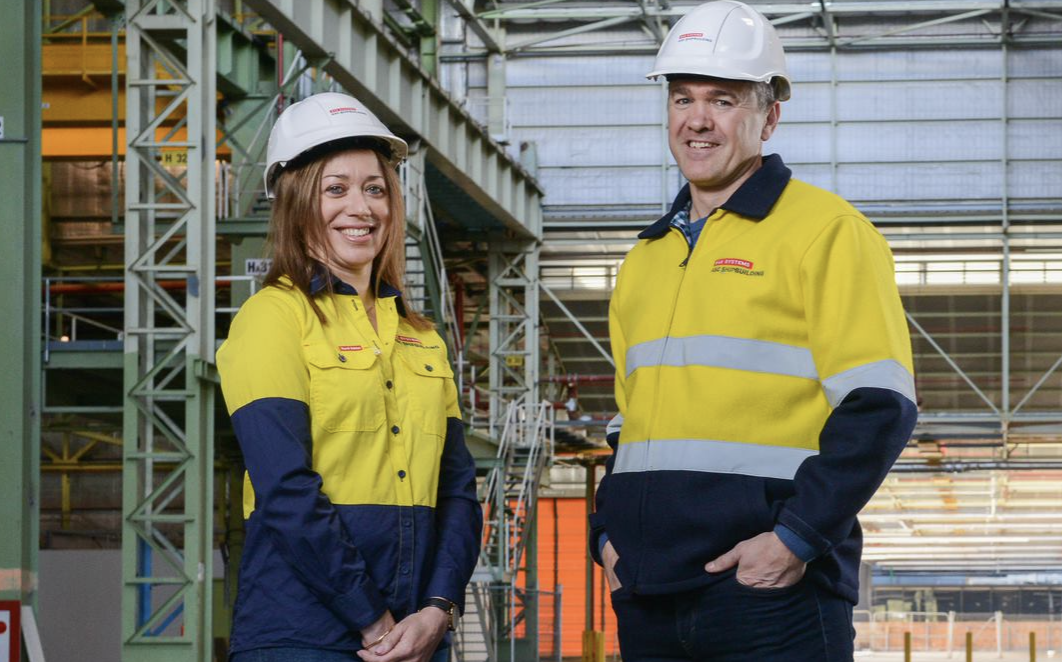
Australia’s first digital shipbuilding course at Flinders University is building new careers and gaining industry recognition.
Just 18 months after going live, the Diploma of Digital Technologies course at Flinders has become a multiaward-winning program. A collaboration between Flinders University and BAE Systems Maritime Australia (formerly ASC Shipbuilding), the program won the Training and Mentorship Program of the Year award at Defence Connect’s 2020 Australian Defence Industry Awards.
Highlighting the University’s positive relationship with BAE Systems and TAFE SA, the Diploma has also won the Industry Collaboration Award at the 2021 South Australian Training Awards, presented by the SA Government’s South AustralianSkills Commission.
Luke and Tamara from BAE Systems explain why the program works.
Luke was a Logistics Support Officer at BAE Systems when he enrolled in the Diploma of Digital Technologies. With 20 years’ experience in the defence industry, and passionate about shipbuilding, Luke saw the program as an opportunity to change the direction of his career.
‘I thought it would be a great opportunity to upskill and be part of the future of shipbuilding,’ he says.
Tamara was urged by her supervisor at BAE Systems to enrol in the Diploma. With a focus on innovation and industry 4.0, cybersecurity, digital design, design for manufacture, cyberphysical systems, robotics, and automation, she knew it would open her up to the world of transformative technologies and build skills that would be directly relevant to her role, now and into the future.
BUILDING CAREERS
In 2020 Luke was one of 51 shipbuilders from BAE Systems to graduate from the very first year of the program. On completion he was appointed to a new role as a Supply Chain Analyst for BAE Systems’ Research and Technology team based at Flinders University’s new Line Zero Factory of the Future, in the Tonsley Innovation District.
BAE Systems is a founding partner of Line Zero, a collaborative environment where a range of companies test advanced manufacturing technologies for potential use in the Hunter Class Frigate Program.
‘The course gave me a firsthand look at the innovations and technologies being used in the shipbuilding industry.’
‘Being in this position gives you the opportunity to help shape what the industry will look like moving into the future,’ says Luke. ‘I really am working with some of the brightest minds in the country.’
DIVERSITY IN THE WORKFORCE
Fifty percent of students in the program this year are women. A working mum with two young children, Tamara is the Industry and Innovation Project Support Officer in BAE Systems’ Tonsley team. She knew the program would be challenging.
‘I have never studied at TAFE or university,’ she says. ‘The course has been challenging but also rewarding. It has provided me with insight into innovation, engineering and design. I’m especially looking forward to learning about cybersecurity.’
‘If you think you don’t have the time or life is busy, I am proving that it is possible,’ she says. ‘There is a good network of support, not only from the lecturers but also from fellow students.’
‘And a hint to mums – you don’t have to have an engineering background to be successful in the Diploma. I have thought like a mum for some of the assignments and it has paid off.’
WORKING WITH INDUSTRY
Professor Giselle Rampersad, the Director of the program and Flinders University’s Professor in Innovation says, ‘The program is a leading and critical training initiative in building digital capability for a range of sectors including defence, advanced manufacturing, medical technologies, and renewables.
‘Our collaborators have included BAE Systems Australia, the Federal and State Governments, the Defence Teaming Centre, the Advanced Technology Project, and TAFE SA.’
EXPANDING DELIVERY
Along with shipbuilders and staff from BAE Systems, the program has expanded to include participants from small and medium-sized enterprises with key roles in the defence supply chain, and STEM school teachers wanting to inspire the next generation of students to meet the needs of industry into the future.
‘Teachers have travelled from regional areas such as Clare, Mount Gambier and the Riverland to join the group of over 100 students currently undertaking this upskilling opportunity,’ says Professor Rampersad.
‘And after just one woman in last year’s program it’s exciting that fifty percent of the participants in this year’s program are women – which is an important part in building gender diversity in the STEM pipeline as well as in engineering and defence.’
GROWING NATIONALLY
Professor Rampersad says Flinders University plans to scale the program nationally.
‘We currently have 11 interstate industry participants from BAE Systems across Victoria, New South Wales, the Australian Capital Territory and Western Australia and we look forward to growing nationally over the coming years to build Australia’s industry competitiveness.’

